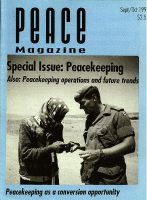
Peace Magazine Sep-Oct 1993, page 10. Some rights reserved.
Search for other articles by Phyllis Creighton here
Is Canada's policy of maintaining only a defensive capability in this field fully respected at all times?
For several years Science for Peace has voiced its views on the chemical and biological weapons (CBW) program of the Canadian military through dialogue with the Biological and Chemical Defence Review Committee (here called "the Review Committee"). The government-appointed Review Committee provides civilian oversight of Canadian CBW research, development, and training programs within the defence establishment. It exists to reassure the Canadian public that only defensive activities are undertaken by the military-and it's reputedly the only such civilian review committee worldwide.
The opening for signature of the Chemical Weapons Convention in January 1993 (which is scheduled to enter into force in January 1995, at the earliest) renews incentives to examine progress in Canada. Work on the chemical weapons control issue by Science for Peace and its colleagues has had international impact, as Walter Dorn reported at our Workshop on Arms Control on May 29. The Hamilton-based Markland Group proposed that all states ratifying the Chemical Weapons Convention should pass penal legislation to ensure prosecution of violators. Science for Peace published that idea in Disarmament's Missing Dimension, and in 1990 it was incorporated into the working draft of the Chemical Weapons Convention.
Markland Group president Douglas Scott and Walter Dorn, who were at the signing in Paris and prepared the Chemical Weapons Convention Index (to be published by the U.N. and available from Science for Peace), are also members of the Science for Peace Chemical and Biological Weapons Committee, which pressed several issues in its meeting on May 31 with the Review Committee:
THE NEED to publish the Review Committee reports in a timely manner. Science for Peace had met with the Review Committee in May 1991 and June 1992 but there are as yet no published reports. Thus we could not comment on how adequately our concerns had been addressed. We were told that only pressure on the Department of National Defence could speed up publication of these reports, which are submitted annually.
THE REVIEW Committee's need to distinguish between "defensive" and "offensive" in operational terms. The Review Committee is mandated to ascertain if "Canada's policy of maintaining only a defensive capability in this field is fully respected at all times." Without a definitional framework an investigating body doesn't know what it is looking for. The committee agreed that clear criteria would be desirable but difficult to define. We hope the the Review Committee gives more thought to this problem.
THE NEED to end the secrecy of CBW agreements and activities. We again asked for a list of the CBW agreements Canada has signed and a summary of the purposes served by them. In accordance with the Charter of the United Nations (Article 102), these agreements should be made public. The Review Committee greeted this request with skepticism. However, we argued that Canada should approach the other parties to seek openness. We also urged that a complete list of all chemical and biological agents produced and kept at Department of National Defence sites be made public, along with a list of all activities of foreign researchers and personnel engaged in experiments at Canadian CBW facilities, past, present, and envisaged. In response to questions, we were told that no efforts are being made to upgrade the Defence Research Establishment at Suffield to a high containment facility.
THE NEED for legislative measures. While the Chemical Weapons Convention requires statutory implementation, we proposed that legislation should also be enacted for Biological Weapons Convention, as has been done in the United States.
THE NEED to expand verification research. The methods and technologies for verifying compliance with the Chemical Weapons Convention are now being developed. Therefore we emphasized the continued contribution of Canadian expertise to international efforts, including Defence Research Establishment at Suffield participation in the interlaboratory comparisons coordinated by the Finnish government. It was dismaying to learn from the Review Committee that the verification work has been reduced and that the mandate for it was recently given to the Department of External Affairs, not the Department of National Defence, so that considerable research expertise is thus being lost.
THE NEED for a broad mandate. In our view, to ensure civilian monitoring of CBW activities in Canada the Review Committee must interpret its mandate broadly. We invited it to verify that Canada is in compliance with all its arms control obligations, including the Biological Weapons Convention and the measures adopted at the Review Conference of that Convention.
We hope its 1993 report will be available, with the previous reports, before our next dialogue.
Phyllis Creighton is a member of Science for Peace and is on the board of Peace Magazine. She is a historian.

Peace Magazine Sep-Oct 1993, page 10. Some rights reserved.
Search for other articles by Phyllis Creighton here